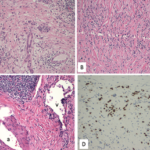 The ACR’s annual State-of-the-Art Clinical Symposium (SOTA) takes place in Chicago, April 4–6. Attendees can network and collaborate as they learn about key diagnostic and therapeutic applications from experts. Here is a sneak peek at some of the topics speakers will explore.
The ACR’s annual State-of-the-Art Clinical Symposium (SOTA) takes place in Chicago, April 4–6. Attendees can network and collaborate as they learn about key diagnostic and therapeutic applications from experts. Here is a sneak peek at some of the topics speakers will explore.
Pregnancy & Reproductive Health in Rheumatology

Dr. Sammaritano
For rheumatology patients, pregnancy often carries increased maternal and fetal risks. Both rheumatic conditions and their treatments can affect multiple aspects of reproductive healthcare.
On April 5, Lisa Sammaritano, MD, a professor of clinical medicine at Weill Cornell Medicine and Hospital for Special Surgery, New York, plans to review basic tenets of reproductive care for rheumatology patients, including safety and therapy considerations for fertility, contraception, pregnancy and menopause. She is the lead author of the 2020 American College of Rheumatology Guideline ffor the Management of Reproductive Health in Rheumatic and Musculoskeletal Diseases and the co-principal investigator for its upcoming revision.1
“My career focus has been to ensure rheumatologists and patients are aware of and up to date on this aspect of health, which affects more than half of our patients,” Dr. Sammaritano says.
Because many rheumatology patients have active disease and/or are taking teratogenic medications, it’s important that rheumatology providers be knowledgeable about safe and effective contraception.
“Rheumatologists, OB-GYNs and patients should all be aware of potential medication interactions and risks,” she says. “In general, rheumatic disease should be under good control, with the patient on pregnancy-compatible medications, before pregnancy is attempted.”
Dr. Sammaritano will also discuss antiphospholipid antibodies (aPL), which may increase the risk of blood clots. This finding makes positive aPL antibodies one of the most important risk factors in reproductive health, given the already increased risk of thrombosis from high levels of estrogen from pregnancy and some contraceptives, fertility treatments or menopause therapies.
Relatedly, Dr. Sammaritano will touch on the 2024 revisions to the Centers for Disease Control and Prevention’s U.S. medical eligibility criteria for contraceptive use with respect to patients with systemic lupus erythematosus (SLE) and/or aPL.2
“These criteria are now closely aligned with the ACR recommendations, and this [change] should allow OB-GYNs to feel more comfortable with current recommendations for use of certain contraceptives in our patients, in particular the use of most types of progestin contraceptives for patients with aPL,” says Dr. Sammaritano.

Dr. Strand
Considerations in Biosimilars
In another presentation on April 5, Vibeke Strand, MD, MACR, FACP, will discuss the introduction of biosimilars in rheumatology and their potential impacts on patients and the field. Dr. Strand is a biopharmaceutical consultant and an adjunct clinical professor in the Division of Immunology and Rheumatology at Stanford University School of Medicine, Palo Alto, Calif.


